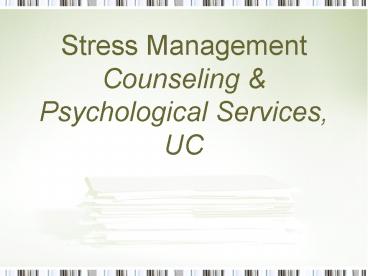Stress Management Counseling - PowerPoint PPT Presentation
Title:
Stress Management Counseling
Description:
Stress Management Counseling & Psychological Services, UC * * * * * * Ask them to fill out ways in which they cope with stress. Share examples, then explain the . – PowerPoint PPT presentation
Number of Views:178
Avg rating:3.0/5.0
Title: Stress Management Counseling
1
Stress ManagementCounseling Psychological
Services, UC
2
What is stress?
- Stress is something that overwhelms a persons
coping abilities - Similar events can lead to different stress
reactions in different people
3
What are some reactions to stress?
- Physical
- 2. Cognitive
- 3. Emotional
- 4. Behavioral
4
1. Physical reactions to stress
- Increased heart rate
- High blood pressure
- Difficulty breathing
- Sweating
- Fight or flight
5
2. Cognitive reactions to stress
- Lack of concentration
- Im sorry, what did you say?
- Forgetfulness
- What time was my appointment?
- Negative thinking
- There is no way I am going to be able to do
this! - Confusion
- Who? What? Where?
6
3. Emotional reactions to stress
- Anxiety
- Depression
- Moodiness
- Anger
- Irritability
7
4. Behavioral reactions to stress
- Increase/decrease in sleep
- Fighting with others
- Excessive drinking
- Drug use
8
Triggers
- Do you know the triggers and your own stress
reactions? - When ______________ happens,
- I ___________________________________
- _____________________________________
- _____________________________________
9
How do you react?
- How do you usually react to stress?
- _____________________________
- _____________________________
- _____________________________
..
10
Here are some ways to manage your reactions.
- Keep emotions in check
- Keep behaviors in check
- Deep breathing
11
Keep emotions in check
- Emotions vary according to your level of stress.
- To maintain stability, focus on controlling
emotions. - For example, if you know you react with anger to
a stressful situation, make an effort to be more
mellow the next time a similar situation arises.
12
Keep behaviors in check
- Know personal triggers to behaviors.
- If you know you drink when under stress, avoid
places that promote drinking. Keep alcohol out of
your home. - If you know seeing a certain person triggers
arguing, plan how to keep your cool. - Try some relaxation exercises every once in a
while. For example, deep breathing
13
deep breathing
- 1. Place one hand on belly and one hand on chest
- 2. Use focal phrases such as relax or calm
- 3. Practice when not under stress
- 4. Make time for brief relaxation daily
14
Here are more ways to cope with stress
- Problem-focused coping dealing with the problem
- Time management
- Social support
- Emotion-focused coping dealing with the emotion
- Acceptance
- Positive thinking
15
Time management
- Set up a priority list
- Use a planner and color code
- Do it nownot later
- Do one thing at a time
- ? For more information on time management
strategies, check out our on-line workshop on
balancing.
16
Social support
- I can look to my family and friends for help,
advice, and support - Talk to family and friends
- Sharing can help give you ideas and advice
- You dont have to go through it alone
17
Acceptance
- It is normal to react
in a certain way in a given situation. - What I am feeling is a normal reaction to
stress - Things are what they are. I must deal with them
18
Positive Thinking
- What is positive thinking?
- Positively worded statements
- Use in the present tense
- Remind yourself daily
- Repeat them regularly
- Belief will follow
- For example
- I am capable I am lovable I
am good enough - Remember Its sometimes easier to say nice
things about others, but you can also say nice
things about YOU!
19
- Negativity can be destructive. It has also been
shown to decrease your immunity, putting you at
higher risk of getting sick. - On the other hand, trying to remain optimistic
in a difficult situation can make it easier for
you to see things more clearly and therefore
better equipped to handle things. - As they say, try to see the glass as half full
instead of half empty.
20
What are you thinking?
- Thoughts are closely related to emotions and
behaviors - Negative thoughts can create or maintain negative
feelings - Changing thoughts can change feelings
- Positive thoughts can increase coping with
difficult situations. For example, failing a
test
21
Failing a test
- Identify negative thoughts that are contributing
- to a negative mood
- Im a failure!
- Im not smart enough!
- Reframe the thoughts
- I failed because I didnt study.
- Im smart, but maybe I need to change my study
habits.
22
Conclusion
- Stress is inevitable
- Know when you are likely to become stressed
- Learn how to recognize your stress reactions
- Know which coping strategies work best for you
- Build those into your day
23
CAPS
- We Offer
- Confidential counseling for UC students
Individual and group - Free walk-in urgent care services during business
hours - Consultation with faculty, staff, family, and
friends concerned about a student - Workshops and presentations stress management,
communication, relationships, and balancing
demands, and other life-enhancing topics! - 225 Calhoun St Suite 200 (513) 556-0648
www.uc.edu/counseling































